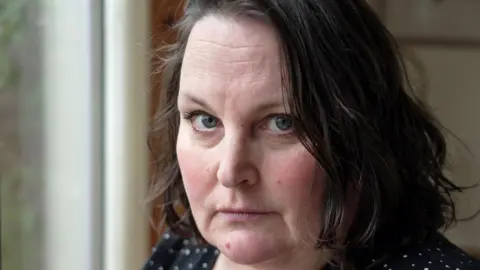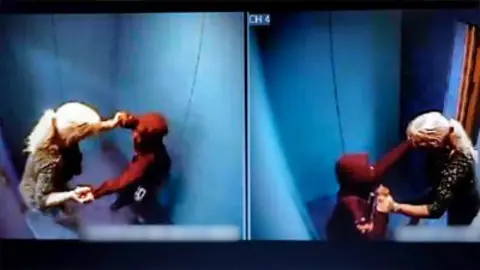'Brutal' restraint of autistic boy in calming room
CCTV of an autistic pupil being restrained by staff in a seclusion room at a special school is "brutal" and "unlawful", a restraint expert has told the BBC.
The footage shows the 12-year-old being held face-down on the floor in a prone restraint involving five members of staff.
His mother, who gave it to the BBC, said she was "horrified" when she watched it.
The management of the school, in Leeds, said multiple investigations found staff had no case to answer and the expert views were a "difference of opinion".
The BBC has also spoken to an autistic pupil who was aged five when he was detained for prolonged periods at a different school.
The BBC's investigation into seclusion - facilities known variously as calming, quiet or safe rooms - began last year when we uncovered CCTV of non-verbal pupils being abused and neglected at Whitefield School in north London.
A spokesperson for the Prime Minister Sir Keir Starmer described those failings as "horrendous" and said they "must never happen again".
Now, we have separately learned of concerns about the use of such rooms elsewhere, including footage recorded in October 2023 at Springwell Leeds Academy North site - a school for pupils with social, emotional and mental health special needs.
The CCTV includes one 50-minute video in which an 12-year-old autistic pupil is repeatedly restrained by staff and shown trying to kick them.
Near the end of the footage, the child swings his arm at staff and is then manoeuvred to the floor. He is then held in a prone restraint for three minutes.
Eric Baskind, an expert on the use of force in institutional settings who has reviewed the footage, said the restraint is "too brutal, unnecessary and, in my view, unlawful" - an opinion endorsed by a second expert asked to review the footage by the BBC.
Mr Baskind said the force was unreasonable as staff members already had control of the boy and could have moved him into a sitting position on the bench instead.
"They just dragged him [into the prone position]," he said. "That would have been really traumatic, and it would have escalated the hostility in the situation, which is the exact opposite of what they ought to have been trying to do."

A third expert, education consultant Elizabeth Swan, said the use of force was "unreasonable, excessive and unnecessarily prolonged".
She also said the room resembled a "holding cell" and many autistic children find being deprived of sensory stimulation traumatising.
The boy's mother, Zoe, requested the footage from the school through an application for his personal information known as a subject access request, and later shared it with the BBC.
"This is a child and these are five grown adults in a school where he's supposed to be safe," she said.
"A calming room should be a room for children to calm down with blankets, teddies and soft lighting. Not a padded cell. You wouldn't put an animal in there."
In response, Wellspring Academy Trust's chief executive, Mark Wilson, told the BBC that it had conducted three investigations into the footage and found no case to answer against staff.
He also said that an investigation by Leeds City Council's local authority designated officer - responsible for managing allegations against adults who work with children - had found that malpractice was unsubstantiated.
In a further statement, Mr Wilson said the incident was typical of those that happen in schools "from time to time" and this "difference of opinion" concerned footage which was "selective", lacking context and sound, and misrepresentative of staff care. He also said the school was rated "good" by Ofsted.

Although the door to the room at the Leeds school was open, the BBC's investigation into seclusion has revealed that pupils are also sometimes locked in rooms elsewhere. Zip up tents have also been used - and even, in one instance, a cage.
We have spoken to an eight-year-old autistic pupil who was repeatedly locked inside seclusion rooms at a different school while aged five.
The boy - whose identity we have protected - told the BBC that being sent there was "horrible" and left him feeling angry and worried.
"It was just very scary because they can put me in there for as long as they want," he said.
Our initial investigation into Whitefield School in London showed pupils being pushed into rooms with Rhino pads - that are often used in rugby training - and also being thrown to the floor and left sitting in vomit, before its calming rooms were shut in 2017.
However, no rules have been changed and schools in the UK are not legally required to tell parents when they place their child in seclusion.
In 2021, 550 hours of CCTV were handed to the Metropolitan Police after it had been discovered by new leadership at Whitefield School - but the force's investigation into staff concluded last year without anyone being charged.
Now the BBC has learned that the local authority where the school is based, Waltham Forest, was warned that calming rooms were being over-used at Whitefield the year before they were shut down following an Ofsted inspection - but it failed to act.
A charity, the British Institute of Learning Disabilities, visited the school and warned of the harms of seclusion. Waltham Forest did not comment when approached by the BBC.

The Education Secretary, Bridget Phillipson, has repeatedly declined to be interviewed about the lack of regulation of calming rooms.
In response to our latest findings, the government said a consultation is under way about use of force and restrictive interventions - and it is awaiting the findings of a Waltham Forest investigation.
Draft guidance asks schools to have a policy on seclusion but this will not be a legal requirement.
Meanwhile, the families of Whitefield pupils have now formed a campaign group that is calling on the government to act.
Maria - the parent of one of the 39 affected Whitefield pupils - said ministers "have seen the footage and said 'this can't happen again' - and yet there's no change."
"Anything that happens to any other child or young person since they said that is on them - as their inaction makes them culpable."
Maria said footage of her son in the Whitefield calming rooms was the "most degrading, dehumanising and undignified video" she had ever seen.
Gemma Grant, of the Challenging Behaviour Foundation charity, said school staff face enormous challenges but seclusion rooms are "outdated and inhumane" and should be banned.
While schools will legally be required to report use of force to parents in England from September, there will still be no statutory requirement to tell them about the use of seclusion, despite it being "really clear it's causing harm to children", according to Mrs Grant.
In Scotland, guidance already advises that schools report seclusion to parents as soon as possible, but it is not a legal requirement. In Northern Ireland, statutory guidance on seclusion is being developed, while in Wales schools are asked to obtain parental consent.
Details of help and support with autism are available in the UK at BBC Action Line
- If you have more information about this story, you can reach Noel directly and securely through encrypted messaging app Signal on: +44 7809 334720, by email at [email protected] or on SecureDrop.
